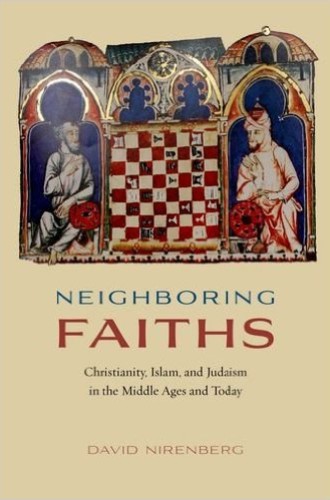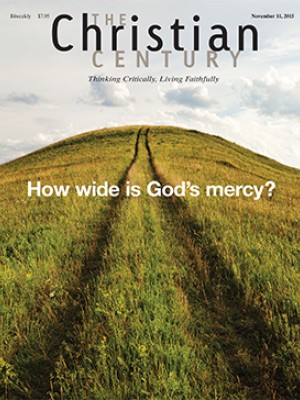Neighboring Faiths, by David Nirenberg
David Nirenberg is a very learned historian who tackles topics of a scope that would be too daunting for most other writers. In Neighboring Faiths, he addresses themes that are critically significant for contemporary debates, and by no means only within the realm of religion.
Nirenberg’s approach runs directly contrary to familiar modern assumptions about the nature and definition of “Great Religions” and about how people belong to them. Particularly in the West, we know that an individual adheres to one faith at any given time, although conversion is certainly possible. The frontiers between those faiths are clear and well patrolled, and dialogue between them is a cautious and tentative enterprise. It is difficult then to imagine non-Western societies—or indeed, earlier Western communities—where such boundaries were much more fluid. But they were. For instance, recent scholarship has stressed how very slow and gradual was the break between Judaism and Christianity in Late Antiquity; in some regions the process stretched over several centuries.
Read our latest issue or browse back issues.
For much of Western history, Christians lived in societies where they were the overwhelming if not exclusive majority, and other faiths were encountered rarely. Jews and Muslims were imaginary beasts whose views demanded little consideration or respect. Yet historically, such exclusivity was not always the rule, and particularly in the Mediterranean world the three faiths often coexisted for centuries.
The best-known example was undoubtedly in medieval Islamic Spain. Modern writers love to tell how believers of all shades flourished alongside each other in cultural and intellectual harmony. This was the legendary and somewhat mythical era of convivencia, which is so often cited as a night-and-day contrast with the intolerant Christianity of most European nations. I describe this view as mythical because the authentic spells of harmony were so regularly interrupted by pogroms and persecutions as to cast doubt on the benevolent image of medieval Islamic societies. The Granada pogrom against Jews in 1066 was as savage as anything Christian Europe would produce during the medieval era. The Iberian Camelot of the modern imagination is, to say the least, highly idealized.
Nirenberg is obviously far removed from any such myth making, or even from simple debunking. Rather, he uses Iberia as a setting to explore how the three faiths interacted so intimately, mainly during the era of growing Christian hegemony after 1250 or so. His central theme is how these neighbors “loved, tolerated, massacred, and expelled one another—all in the name of God.” Jews, Muslims, and Christians were indeed all children of Abraham, and that extended family was often spectacularly dysfunctional, but it was a family.
Although well thought out, Nirenberg’s book is avowedly a collection of case studies and essays rather than a thoroughly integrated whole. This means that he offers in-depth treatments of specific incidents, such as the hideous Valencia massacres of 1391, when Christians slaughtered the city’s Jews, and the events he discusses in the chapter titled “Deviant Politics and Jewish Love: Alfonso VIII and the Jewess of Toledo.”
Nirenberg offers splendid and seemingly paradoxical accounts of such religious interactions. He shows repeatedly how scholars constructed their religious foes in the grimmest possible terms, and Iberia produced many such fierce polemics. Such tracts coexisted with extensive social and family contacts that were friendly and often intimate. We see Jews, Muslims, and Christians “interacting not only as abstractions or categories in each other’s theologies and ideologies, but also as neighbors forced to jostle together on narrow streets, figures of thought elbowing figures of flesh, and in the process transforming both.”
There would have been no need for legislatures and councils to continue forbidding intermarriage and interfaith sex unless ordinary laypeople were enthusiastically engaged in these practices. And at least some of those who were not marrying outside their religion were boldly going into the brothels assigned to those other faith communities. Spain inevitably, and uncomfortably, became a land of mixed blood, a fact that tormented later generations.
Also, political exigencies meant that power struggles often crossed religious lines. Spain’s legendary Christian warrior was El Cid, whose Arabic-derived name was bestowed by his allies and vassals. Christian writers often criticized Catholic rulers for their excessive kindness to Jews and Jewish communities, a tolerance that was overruled by infuriated Christian mobs. In the 17th century, Miguel Cervantes drily credited his Don Quixote, Spain’s greatest literary classic, to a fictitious Moorish author named Cide Hamete Benengeli.
Plenty of scholars have discussed interfaith relations in this region and have examined how thinkers of each religion portrayed their counterparts. What makes Nirenberg’s book distinctive is his emphasis on how such conversations reshaped the self-image of the religion undertaking the portrayal—how, for example, when Christians studied Islam, their observations redefined Christian identity.
Such redefinitions could lean in the direction of tolerance. Though a medieval Christian might think that a particular idea or practice is characteristic of Muslims and therefore should be avoided at all costs, the idea or practice often leads to the opposite response—members of one group almost unconsciously adopt the practices of their neighbors because they are part of the general cultural ambience and part of what it means to live in that society.
In Iberia, that kind of assimilation in turn inspired new and more intolerant religious movements, which sometimes originated outside of Iberia. Time and again, just as Muslims and Christians were learning to coexist, Christian Crusaders and Islamic jihadis arrived to rebuild the walls between the faiths.
Meanwhile, internal reformers zealously sought to draw firm and proper boundaries. As the Spanish-born St. Vincent Ferrer noted in the early 15th century, “The neighbor of a Jew will never be a good Christian.” Spiritual contamination could be avoided by ensuring that non-Christian neighbors converted to the true faith, willingly or otherwise, and Vincent toiled strenuously to win over Jews. He was at his most active in the generation or so after the massacres of 1391, an age of mass conversions when concepts of social and racial identity were in a process of rapid transformation. Vincent became the patron saint of builders precisely because attitudes and acts like his constructed a religiously and racially pure Spain.
Over time, still more radical solutions suggested themselves. Gradually expulsions of religious minorities escalated from local and regional affairs to the thorough national cleansing that reached its culmination in the 17th century. By that point, Spanish governments were no longer content to remove Jews and Muslims (those groups had long gone), but struck at their converted descendants who had formally accepted Christianity, the conversos and Moriscos. Even remaining close to a tainted faith was now enough to attract vengeance.
One of Nirenberg’s major themes is the emergence, especially during the 15th century, of genealogical obsessions applied to Jewish identity that came uncomfortably close to a modern-sounding rhetoric of race. He devotes an important chapter to the vexed question of whether there was race before modernity and argues that in the Iberian context, the concept was scarcely avoidable.
It is tempting to extend Nirenberg’s analysis to other regions where Islam rather than Christianity won the decisive political victory. If we look at Egypt, another great land of three faiths, we see close parallels to the systematic hardening of attitudes that Spain experienced, and in the same years. In both lands massacres and forced conversions became much more frequent. It was not just that Christianity was becoming harsher and more intolerant in the late Middle Ages. Rather, larger transnational forces were at work, economic and social trends that were influenced by the change in climate.
By the early 16th century Spanish elites had thoroughly convinced themselves of the intimate alliance between race and faith, and those ideas profoundly influenced the lords and warriors who set off to conquer the New World. The ideas formed in encounters with Moors were now applied wholeheartedly to Aztecs and Incas. The conquistadors who invaded Mexico invoked James as their patron saint—Santiago Matamoros, the Moor-slayer.
The book’s final chapter is “Islam and the West: Two Dialectical Fantasies,” which pulls together themes of the construction of history and memory that appear sporadically throughout the work. How should we regard interactions between communities of different faiths, whether in the past or in the present? One popular solution is to imagine the West and Islam as utterly different categories in perpetual struggle, a continuing clash of civilizations, although such a view represents an abandonment of critical historical sense. Scarcely less improbable, though, is the modern romanticization of the old Arabic Spain, the “fairy tale” of al-Andalus and convivencia. Nirenberg’s comments on these debates are judicious and balanced.
Neighboring Faiths is an excellent book that thoroughly repays careful reading and reflection, but it is not primarily for the general reader. Nirenberg is a scholar writing primarily to scholars; the 210 pages in the chapters are followed by more than 70 pages of endnotes in small type. Nonacademics will find his work densely argued and sometimes heavy going. Any reader who perseveres, though, will be richly rewarded.








